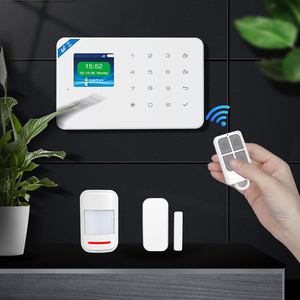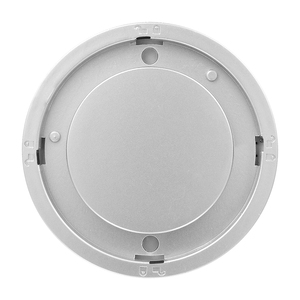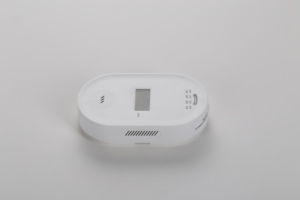(15385 products available)














































































































































































































New alarm systems are developed in different types to suit various security needs. This section elaborates on these types to help buyers make informed decisions when purchasing wholesale security products.
More and more modern alarm systems are going for wireless options. This makes them easier to install and more adaptable. As great as that is, the growing preference for wireless systems often stems from the increased cost, as they are generally more expensive than wired systems. In fact, the initial setup costs for a new wireless alarm system can be significantly higher due to the need for specialized equipment and technology. These systems rely on battery-powered sensors and wireless communication to detect intrusions. This eliminates the need for complicated wiring.
Smart alarm systems are essential in this era of rapid technological advancement. These systems take configuration and management to a new level. One can control modern systems via smartphones, tablets, or computers. In this way, users access real-time alerts, live video feeds, and activity logs from anywhere in the world. Further, many systems integrate with other smart home devices, such as smart locks, lights, and cameras, to guarantee a holistic approach to security. The ability to manage security remotely offers unparalleled convenience and peace of mind for homeowners and renters alike.
Buyers should be aware that alarm systems intended for commercial use have distinct features as compared to those intended for home use. What makes commercial alarm systems different, however, is that they are purposely built to handle the high demand of large-scale operations. Therefore, businesses looking to install security systems for their premises can confidently reach out to wholesalers and distributors to restock these alarm systems. Furthermore, these commercial systems frequently include features like integrated fire and carbon monoxide detectors, advanced access control capabilities, and the option for on-site monitoring. These features suffice the unique needs of various business ventures.
Buyers, particularly business owners and managers, should consider the following alarming industry trends that could help them outshine their competitors.
The trend toward incorporating new alarm systems with Internet of Things (IoT) devices is benefiting a lot of people. The systems are not just smart anymore. They can now communicate with various connected devices like thermostats, lights, and even refrigerators. This integration allows for complex automations and monitoring scenarios, enhancing overall safety and energy efficiency. For example, if an alarm is triggered, connected smart lights could flash to alert residents, while a smart thermostat could automatically shut down to prevent the spread of smoke or fire.
As security alarm systems get smarter, they also become more susceptible to hacking. That is why, in 2023, the importance of cybersecurity for these systems has risen immensely. People are not just securing physical locations anymore but are also learning how to protect the data residing on the new alarm systems. Companies are beginning to implement more robust encryption protocols and secure software updates to protect against potential cyber threats. This is even more prominent among businesses that handle sensitive data and require higher levels of security, and it trickles down to homeowners in 2023.
There has always been a conventional approach to monitoring alarm systems. This conventional approach has always involved professional third-party services. However, it is quite interesting how this year people increasingly favor subscription-based monitoring services. A good number of people now choose flexibility and affordability.
Entertainment and media businesses can benefit from reading this section. After all, it discusses the wholesale scenarios and requirements for these alarm systems, which managers in these spaces should consider.
The alarm system installation process varies based on the type of system chosen—wired, wireless, or smart. Wired systems generally require professional installation, as extensive drilling and wiring into walls is often necessary. The process can take several hours, depending on the size of the property and the number of cameras or sensors being installed. Wireless systems, on the other hand, offer more flexibility and can often be installed by the property owner. Most wireless alarm sensors are mounted using adhesive, while the control panel is positioned at a central location. This makes their installation a straightforward DIY task.
Smart alarm systems usually fall somewhere in between. While some devices, like doorbell cameras, are simple to install, others may require professional help to ensure proper integration with existing smart home systems. Watsons for smart devices are easily integrated, and their installation is a little different compared to the conventional new alarm systems. However, it is always good to have a professional check all installations and monitor the systems for optimal performance.
Once the new alarm system is in place, its daily use tends to be straightforward, particularly for wireless and smart systems. Most modern systems are controlled via smartphone apps, allowing users to set, disarm, and monitor the system from anywhere. For wired systems, the traditional keypad is often still in use. Daily checks are crucial for ensuring that all components are functioning correctly. Furthermore, users should also get into the habit of reviewing activity logs and real-time alerts to stay informed of any potential security breaches. Lastly, one should never ignore system alerts, as they could be a critical notification of an intrusion or malfunction.
Understanding the making materials of an alarming system aids in evaluating its quality, lifespan, and reliability. The following are the common materials used to manufacture these systems.
The majority of alarm system components, including sensors and camera housings, are made out of plastic. Though lightweight, this material was designed to withstand extreme temperature changes and environmental elements.
Alarm system parts, including mounts, casings, and some internal components, use metal for premium quality and durability. Metal not only enhances strength, but it also increases the system's resistance to tampering and vandalism. However, metal parts come with the downside of being more expensive compared to plastic. This is so because metal-based components are pricier than their plastic counterparts and thus increase the total cost of the alarm system.
Manufacturers mount various components of alarm systems onto circuit boards. These printed circuit boards (PCBs) are made from a combination of fiberglass and epoxy resin. This material combination aids in providing the necessary electrical connections between components while ensuring durability and resistance to heat.
A significant number of modern alarm systems feature glass-break sensors. These sensors, commonly found in wired alarm systems, have highly sensitive microphones that detect the unique sound pattern of breaking glass. The reason for going with glass as a material for these sensors is its quality. Glass is robust and resistant to various environmental factors. Moreover, its ability to efficiently transmit sound aids in the accurate detection of glass breakages.
The silicone rubber used in making alarm systems reduces false alarms. It makes the system more reliable by protecting sensitive components during manufacturing and environmental noise exposure. Silicone, being highly flexible and resilient, also acts as a protective layer against impact and vibration. This ensures that the sensors react accurately under real intrusion threats and not due to outside factors like construction noise.
To make a worthy investment, buyers have to evaluate the following factors when purchasing alarm systems in bulk.
Buyers should look into the monitoring options available for their chosen alarm systems. They have professional monitoring, which many systems offer. With this option, an alarm company staff will always monitor the systems. When an intrusion is detected, they will notify the authorities. Buyers should also consider systems that offer self-monitoring through mobile apps. This option provides alerts directly to the user.
Retailers should get alarm systems that can grow with their customers' security needs. Systems that allow for additional sensors, cameras, or other components are ideal for businesses that will expand or change over time. Furthermore, alarm systems that offer customizable packages enable customers to tailor their security solutions to match their unique requirements.
A reliable customer support team and readily available products will surely guarantee optimal performance and availability in the market. Therefore, buyers should prioritize monitoring alarm systems that come with comprehensive customer support. There should be the availability of installation assistance, technical support, and even routine maintenance. Also, retailers should ensure that the alarm systems they settle for can easily be acquired at wholesale from reputable manufacturers. A steady supply of these alarms will make it easier for them to meet the growing market demand.
A1. Alarm systems are manufactured with residential homeowners in mind and with businesses that require commercial security. Although, practically, any entity that seeks to enhance its security will benefit from these systems. Especially those that have high-traffic areas, valuable assets, or sensitive information. That being said, entertainment and media businesses are the most ideal buyers because they often have large spaces to secure and complex security needs.
A2. In instances where the old system was wired, removal would positively benefit the new alarm system by eliminating potential wiring complications. However, if the old alarm system was wireless, then it would negatively affect the new alarm system. This is so because the old alarm will leave remnants of wireless interference. This will cause the new alarm system to perform poorly, hence negatively affecting the newly installed alarm system.
A3. Regular system checks, maintenance, and software updates will not only optimize the alarm system but also make it last longer. Furthermore, environmental factors such as extreme weather conditions, dust, and humidity affect the life of alarm systems, especially outdoor ones. Therefore, these factors should be eliminated where possible.
A4. Buyers should ensure these alarm systems have warranties and good customer support because they will be the first point of contact if a product has a problem.